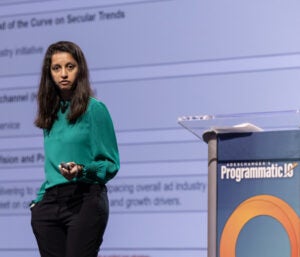Here’s today’s AdExchanger.com news round-up… Want it by email? Sign up here.
Add To CART
Instacart filed for its initial public offering (IPO) on Friday. Shares should start trading next month (under the stock ticker CART, of course).
Call it a thawing of the tech IPO market, which has been frozen for a year and a half. The marketing automation platform Klaviyo also filed for an IPO on Friday.
For Instacart, going public is a reinforcement that the company’s strategy as both a subscription and advertising business seems to be working, Eric Seufert writes.
Because its business is rooted in ecommerce, Instacart can monetize with ads in ways that other mobile apps cannot as a result of Apple’s ATT, which limits user-level tracking.
For example, one of the most popular forms of advertising on Instacart’s app is branded search, where brands can bid against a competitor’s name to appear first in a search or to appear on a competitor’s product page.
Instacart estimates that its ads deliver more than 15% incremental sales lift on average.
Based on the numbers in the S-1 filing, advertising and subscription revenue combined made up nearly half of its total revenue for the first six months of 2023.
May AI Take Your Order?
Speaking of food delivery apps, they’re getting awfully friendly with AI.
DoorDash just rolled out AI voice-ordering tech (available in multiple languages) that will answer customer calls when restaurants are busy, letting employees turn their attention to in-store customers, TechCrunch reports.
Customers who call can avoid missed calls and won’t have to endure lengthy wait times listening to hold music. People will be on hand to step in if customers need human helpers.
The tech is also seemingly a smooth-talking upseller, suggesting items customers can add to their orders. It glibly offers return customers the opportunity to reorder past meals as well.
Meanwhile, DoorDash rival Uber Eats is developing an AI chatbot that will proffer recs to customers, according to Bloomberg.
More brick-and-mortar food purveyors are also getting in on AI in an attempt to smooth the food ordering process. An Ohio Wendy’s added a drive-through chatbot in May, White Castle plans to add AI drive-through voices to more than 100 drive-throughs by 2024, and IHOP is teaming up with Google Cloud to provide menu recommendations for online orders.
Out Of Control
Apparently, the first-world problem of “there’s too much TV to watch” is a real thing, Bloomberg reports.
The number of titles on streaming services jumped 39% over the past two years, according to a report Nielsen publicized on Monday. Which would explain why it feels impossible to pick the right show to watch.
The average time it takes someone to find something to watch has risen to 10 and a half minutes, a three-minute increase from 2019. The hassle supposedly makes 1 in 5 viewers give up entirely on their viewing session.
It’s especially a missed opportunity for advertisers, which can’t reach viewers through ad-supported video-on-demand (AVOD) if those viewers can’t pick something to stream.
Considering how much streaming relies on advertising – AVOD is on track to grow revenue faster than its subscription-based counterpart – platforms may very well have to answer to advertisers about content discovery.
A solution could come in two flavors: Platforms can either minimize their content libraries or reorganize them into a more user-friendly interface. (Or both.)
But Wait, There’s More!
ChatGPT generates targeted political campaign ads in blatant violation of OpenAI’s rules and without regard for disinformation. [The Washington Post]
AI video startup Tavus gets $18 million in Series A funding. [The Information]
Speaking of AI, there are downsides to having too much of it on the web. [Axios]
Why Linda Yaccarino might just have the toughest CEO job on Earth. [Insider]
The end of the Googleverse. [The Verge]
You’re Hired!
Netflix poaches another top Snap exec, David Roter, for its advertising business. [Insider]

















